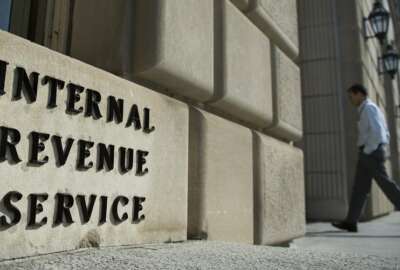To listen to the Federal Newscast on your phone or mobile device, subscribe on PodcastOne or Apple Podcasts. The best listening experience on desktop can be found using Chrome, Firefox or Safari.
- There could be some controversy with the Veterans Affairs Department’s new community care access standards. VA will announce new standards for veterans to access care outside the department later this week. They’re part of VA’s effort to streamline seven disparate community care programs into one. VA Secretary Robert Wilkie said the standards will form the basis of new regulations that will implement the VA MISSION Act. Congress passed the MISSION Act last summer, as a replacement to the VA Choice Act. (Department of Veterans Affairs)
- Senate Veterans Affairs Committee Ranking Member Jon Tester (D-MT) and over 25 other Senate Democrats said they’re “deeply troubled” by VA’s plans for the new community care standards. They told Wilkie that they’re worried about the projected costs, and the new options that VA is planning to allow veterans to see private sector providers. Tester said lawmakers initially envisioned veterans could use community care for three or five clinical services. But Tester said he’s worried VA has decided to expand private-care access for nearly all clinical services. VA must submit a report to Congress within the next five weeks detailing its plans for new access standards. (Senate Veterans Affairs Committee)
- Federal payroll staff worked over the past weekend to start processing back pay for employees impacted by the partial government shutdown. Office of Personnel Management acting Director Margaret Weichert said most paychecks should go out by Jan. 31. The Interior Business Center said it will issue back pay for the two missed paychecks in two installments. Both are considered 2019 taxable income. The National Finance Center said its employees will receive one lump sum, but deductions will be taken off for each of the two pay periods. (Federal News Network)
- The Congressional Budget Office said some of the economic damage the partial government shutdown caused is reversible, but not all of it. A new CBO estimate said the shutdown took an $18 billion bite out of the U.S. economy. Some of the downturn will reverse itself once federal employees and contractors get their overdue paychecks, but CBO believes around $3 billion of the GDP drop is permanent. And because IRS employees were mostly furloughed, the Treasury Department lost an estimated $2 billion in tax revenue from the enforcement actions the IRS couldn’t conduct. (Federal News Network)
- The IRS processed “several million” tax returns on Monday, in the opening hours of the tax filing season. But the National Taxpayer Advocate is raising concerns about the partial government shutdown’s impact on the agency. The Washington Post reported it told House staffers, the IRS could take up to a year to fully recover from the shutdown’s impact. A House committee staffer confirmed the briefing to Federal News Network. (Federal News Network)
- Private collection agencies only brought in 2 percent of the debts the IRS hired them to gather. The Treasury Inspector General for Tax Administration found they brought in more than $88 million, from 700-thousand cases assigned to them, between April 2017 and September 2018. That’s compared to the $5.7 billion the IRS expected them to collect. The 2015 Fixing America’s Surface Transportation Act requires the IRS to hire private collection agencies. (Department of Treasury)
- Tens of thousands of federal workers who are in the Reserves and National Guard may have better healthcare options soon. A new bipartisan bill would allow guardsmen and reservists to buy healthcare from the TRICARE Reserve Select plan, instead of forcing them to buy into the Federal Employees Health Benefits Program. TRICARE Reserve Select is currently available to all guardsmen and reservists unless they work for the federal government. (National Guard Association of the United States)
- Chief of Naval Operations Admiral John Richardson said the Navy is shooting itself in the foot when it comes to delivering innovative products to sailors. Richardson said the Navy’s current system slows down the process of bringing ideas from the labs to the battlefield. He said budget stability will help the Navy plan better and deliver goods faster. (Federal News Network)
- Acting Chief Management Officer for the Defense Department Lisa Hershman is touting the Pentagon’s savings accomplishments. She told ABC News that DoD has saved $4.7 billion dollars over the past two years, and is on track to reach $6 billion in fiscal 2019. She said the Pentagon’s first ever audit helped identify potential areas to save. (ABC News)
- The Energy Department’s liabilities are growing faster than its assets. According to DOE’s 2018 financial statement, liabilities grew by $90 billion last year, while assets grew by only eight billion. In all, Energy has more than $600 billion of unfunded liabilities. The fastest growing liability is environmental cleanup. Energy attributed that to new estimates of costs for construction and operation of a waste treatment plant for the Hanford, Washington site, where materials for the military’s nuclear arsenal were made. (Department of Energy)
- Maryland and Virginia senators are worried about the DC Metrorail system being compromised by foreign actors. All four democratic lawmakers wrote to Metro CEO Paul Wiedefeld, asking why a recent request for proposals from the Washington Metropolitan Area Transit Authority did not include a requirement to favor U.S. companies. While admitting nearly all rail cars in the U.S. are foreign made, they want to know how WMATA is making sure no foreign governments are involved in the procurement process. (Sen. Mark Warner)
Copyright
© 2025 Federal News Network. All rights reserved. This website is not intended for users located within the European Economic Area.




